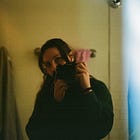(Hi from the parenthetical peek behind the curtain! This is the second time I’ve tried to write this post. I was going for a clicky “best audiobooks of the summer”-type story. I practically wrote the whole thing, and then I realized something: I honestly wouldn’t recommend any of the books I’ve listened to in the last few months. How devastating.; but also… how interesting. Maybe I should write a post about that…)
My New Year’s resolution was to spend more time listening to books. This goal arose from the constant feeling that (*cue the dramatic music*) “I wasn’t reading enough/could be reading more widely/would never read every book I wanted to read in my lifetime.” By adding the audio format to the mix, I believed that I could double my reading time and my reading enjoyment.
As it turns out, it was a huge miscalculation and yet another win for the “more is more” attitude that plagues our culture. My apathy toward most of the audiobooks I listened to this summer has taught me an important lesson: Any time I want to increase my enjoyment of something, I try to do more of it. What if, instead, I tried to read less?
Soft reading is deep reading

A few months ago, I took a screengrab of a quote on are.na. It reads, “I know most people try hard to do good and find out too late they should have tried softer.” At the time, the quote spoke to me because I’d just started pitching my novel to agents. I felt like I was banging my fists on the door of the literary world and feeling increasingly frustrated by the long silences on the other side. What if, instead, I knocked gently (yet firmly) until, finally, they let me in?
In practice, this means creating cozy writing rituals and wrapping myself in blankets as I hit “send” on some of the scariest emails of my life. I’ve even taken to calling myself “baby” and speaking in the third person.
“Baby needs a nap!”
“Sorry, can’t make it tonight. Baby needs to watch a rom-com.”
“Baby wants a cookie!”
(Yes, as you’ve probably already gathered, this elicits an eye-roll from everyone in my near vicinity. But it works.)
Of course, life lessons rarely happen in only one area of our lives. A lot of this human thing is interdisciplinary. And yet, we do love to compartmentalize, and I compartmentalized the hell out of this whole “try softer” thing. While I was going full baby in my writing life, I was acting like a Catholic nun with a ruler when it came to reading:
“Read more! Dedicate yourself to your craft! You’ve been reading the same book for nine days! Unacceptable!”
What the Catholic nun inside of me doesn't get (Well, one of the things she doesn’t get. She’s pretty out of touch, TBH) is that we get so much more out of reading when we take our time. When we want to read more, we automatically think that means more books. The world delivers. Although there aren’t great estimates of how many books get published each year, the consensus seems to be upwards of 500,000 titles. Not to mention the backlog of “classics” that have become a moral imperative for the literary-minded.
What if more actually means deeper? What if what I wanted on December 31, 2023, wasn’t more novels under my belt but more from the books on my shelves?
On finding more in books, instead of just more books
All of this brings me to this Ezra Klein interview featuring literacy scholar Maryanne Wolf. In the pod, Wolf introduces the idea that what we call “reading” (or, more specifically, deep reading) is actually a complex web of neurological processes. We’re not only receiving plot points. We’re putting ourselves in the character’s shoes. Activating our empathy. Predicting what will happen next. Filling in the setting using our own memories. Philosophizing. Dreaming. Sinking into another world.
“There are different levels in which we can participate in the text,” says Wolf. “We can use our ability to take on another perspective to read in a whole different way. We are entering almost like the theory of mind of another and also their feelings. This is a totally different form of reading than the one that we are talking about when we are saying we read for information.”
In my efforts to introduce more books into my life this year, I’ve actually diluted every reading experience I’ve had.
From now on, I’m going (to try) to measure my reading life by other metrics, which will be the subject of next week’s paywalled post. If you’re not already a paid subscriber, please consider it. You can click here for 30% off a year of Life Lives. (The math = less than $3 per month.)
I’d also love your advice! How do you avoid the “more is more” trap when it comes to books and reading? How do you read deeper? Help!
As I’m writing this, I’ve almost passed that 15,000-word mark (about one-fourth or one-fifth of a draft). And this feels… wow. I love that even when you don’t feel like you’re writing “enough,” you can get a lot done. A few sentences can accumulate over time until — at last! — you have a whole novel. It’s the only time math has ever felt magical to me.
Thank you, as always, for reading Life Lives.
If you haven’t already downloaded the Substack app, I highly recommend it.
The app is how you’ll access the full value and experience of your subscription to Life Lives.













I love what you said about how we read and what happens when we read - it makes me think about how many ways there are to read the same text! Recently I've been inspired to re-read more books, and now thanks to your essay I'll also be thinking a lot more about how I'm re-reading!
- S